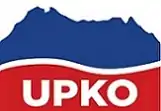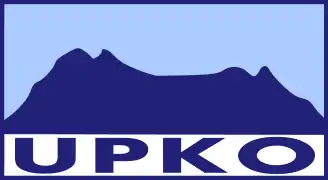United Progressive Kinabalu Organisation
The United Progressive Kinabalu Organisation (Malay: Pertubuhan Kinabalu Progresif Bersatu; abbrev: UPKO) is a multiracial political party based in Sabah, Malaysia.[1] The party was rebranded from its previous party's name, United Pasokmomogun Kadazandusun Murut Organisation using the same UPKO acronym; which was a widely known Kadazan-Dusun-Murut based party in 2019.[2] The party had earlier been renamed once before in 1999 from its initial 1994 formation name of Sabah Democratic Party.[3]
United Progressive Kinabalu Organisation | |
|---|---|
 | |
| Malay name | Pertubuhan Kinabalu Progresif Bersatu ڤرتوبوهن كينبالو ڤروڬريسيف برساتو |
| Chinese name | 神山前進統一機構 神山前进统一机构 Shénshān qiánjìn tǒngyī jīgòu |
| Abbreviation | UPKO |
| President | Wilfred Madius Tangau |
| Chairperson | Michael Sitom Malanjun |
| Secretary-General | Nelson Angang |
| Spokesperson | Albert Bingkasan |
| Deputy President | Donald Peter Mojuntin |
| Vice-President | Ewon Benedick Lucas Umbul Gilbert Syam Pangiran Lalung |
| Women Chief | Juliana Jani |
| Youth Chief | Felix J. Saang |
| Treasurer General | Laurentius Nayan Ambu |
| Founder | Bernard Giluk Dompok |
| Founded | March 1994 (Formation of Sabah Democratic Party) 8 August 1999 (Renamed as United Pasokmomogun Kadazandusun Murut Organisation 24 November 2019 (Renamed as United Progressive Kinabalu Organisation) |
| Split from | United Sabah Party |
| Preceded by | PDS UPKO |
| Headquarters | PO Box 420, Lot 9 & 10, 2nd & 3rd Floor, New World Commercial Ctr, Donggongon, 89507 Penampang, Sabah |
| Ideology | Regionalism Multiracialism |
| National affiliation | Barisan Nasional (1994–2018) Pakatan Harapan (allied coalition) (since 2018) |
| Colours | Blue, white and red |
| Slogan | Misompuru Tokou Wagu Mari Kita Bersatu Kembali (Let Us Be United Again) |
| Dewan Negara | 1 / 70 |
| Dewan Rakyat | 1 / 222 |
| Sabah State Legislative Assembly | 1 / 79 |
| Election symbol | |
 | |
| Website | |
| www | |
 |
|---|
| This article is part of a series on the politics and government of Malaysia |
|
|
History
Sabah Democratic Party
The party started as Sabah Democratic Party or Parti Demokratik Sabah which was founded by Bernard Giluk Dompok and other detractors who split from United Sabah Party or Parti Bersatu Sabah soon after the Sabah state election in March 1994 to join the Barisan Nasional coalition.[4] PBS had initially won a majority in the Sabah State Legislative Assembly then but with the two breakaway factions, one led by Dompok to set-up PDS and another led by Joseph Kurup to form United Sabah People's Party; had caused the crumble of PBS new Sabah government and allowed BN to form the government instead.[5] Part of the enticement offered by BN to the defectors was the promise of a rotating Chief Ministers of Sabah post, which Dompok held from 1998 to 1999.[6] The defection from PBS however damaged the party at the 1995 federal election, in which it won no seats.
United Pasokmomogun Kadazandusun Murut Organisation
PDS was renamed as United Pasokmomogun Kadazandusun Murut Organisation or Pertubuhan Pasokmomogun Kadazandusun Murut Bersatu on 8 August 1999, taking the same acronym of the now defunct original United Pasokmomogun Kadazan Organisation, which was formed and dissolved in the 1960s by Fuad Stephens.[3] The name of the new UPKO includes the words "Kadazandusun" and "Murut", with a new logo of a silhouette of Mount Kinabalu and was not a water buffalo as in the old UPKO logo.[4] It was redefined as an ethnically-based party striving to voice the rights and advance the development of KDM populations of Sabah and the Orang Asli of Peninsular Malaysia.[7][8]
The party won three federal seats at the 1999 election, and four at the 2004 and 2008 polls. In 2009, UPKO opened four divisions in Perak, seeking a foothold among local Orang Asli indigenous people.[7] In the Malaysian general election, 2013, the party was reduced from four to three federal seats and from six to four state assembly seats. Dompok lost his federal seat to the People's Justice Party. The following year he resigned as the party's president, a position he had held for 20 years.[9][10]
UPKO was one of the component parties in the Barisan Nasional coalition which ruled Malaysia until 2018. The party's core Sabahan indigenous constituency includes many Christians, while BN is, on a national scale, dominated by the United Malays National Organisation, an overtly Muslim-Malay party. While a member of the BN federal government, UPKO often spoke out about government policies affecting Christians. In 2013, the party's president Bernard Dompok distanced himself from Prime Minister Najib Razak on the contentious question of the use by Malaysian Christians of the word "Allah" to describe God. Najib had supported a government appeal to the High Court seeking to outlaw the word's use by a Christian newspaper; Dompok criticised the appeal and defended the right of Christians, especially indigenous Malaysians, to use the word.[11]
UPKO also agitated, often against the national government of which it was a part, for tougher measures against illegal immigration in Sabah. In February 2012, UPKO succeeded in forcing the establishment of the Royal Commission of Inquiry on illegal immigrants in Sabah. In the same year one of the party's federal parliamentarians, Wilfred Bumburing, quit UPKO and joined the opposition PKR in protest at what he considered to be government inaction on illegal immigration.[12]
UPKO was an advocate for the repeal of the Internal Security Act, which for over 50 years permitted detention without charge in certain circumstances. The law was repealed in 2011.[13]
In the 2018 general election, the party won only one federal seat and five state assembly seats. Following this, the party's acting president Madius Tangau announced that UPKO with five of their party state assembly seats members had left BN to form a coalition government with the Sabah Heritage Party, alongside PKR and DAP and became a partner party for the Pakatan Harapan coalition instead.[14][15]
- Logos of Party
 PDS logo (1994-1999)
PDS logo (1994-1999) UPKO logo (1999-2019)
UPKO logo (1999-2019)
United Progressive People of Kinabalu Organisation
The party was re-branded again as United Progressive People of Kinabalu Organisation or Pertubuhan Kinabalu Progresif Bersatu while retaining its existing UPKO acronym on 23 November 2019.[2][3][16] There is also a slight change in UPKO's logo with the inclusion of a new colour, red while the Mount Kinabalu image remains.[1][4] The party re-branding process was aimed to migrate from the communal politics to a universal and inclusive politics by opening the party membership to other races than KDM communities.[1][3]
Leadership Structure
|
|
Elected representatives
UPKO currently holds one seat in the federal House of Representatives, one in the Senate and one in the Sabah State Legislative Assembly.
Senators
- Sabah State Legislative Assembly:
- Donald Peter Mojuntin
Members of Parliament of the 14th Malaysian Parliament
UPKO currently has a single MP in the Dewan Rakyat.
| State | No. | Parliament Constituency | Member | Party | ||
|---|---|---|---|---|---|---|
| P170 | Tuaran | Wilfred Madius Tangau | UPKO | |||
| Total | Sabah (1) | |||||
Dewan Undangan Negeri (State Legislative Assembly)
Sabah State Legislative Assembly
| State | No. | State Constituency | Member | Party | ||
|---|---|---|---|---|---|---|
| N7 | Kadamaian | Ewon Benedick | UPKO | |||
| Total | Sabah (1) | |||||
General election results
| Election | Total seats won | Total votes | Voting Percentage | Outcome of election | Election leader |
|---|---|---|---|---|---|
| 1995 (as PDS) |
0 / 192 |
Bernard Giluk Dompok | |||
| 1999 | 3 / 193 |
(Barisan Nasional) |
Bernard Giluk Dompok | ||
| 2004 | 4 / 219 |
55,117 | 0.79% | (Barisan Nasional) |
Bernard Giluk Dompok |
| 2008 | 4 / 222 |
58,856 | 0,74% | (Barisan Nasional) |
Bernard Giluk Dompok |
| 2013 | 3 / 222 |
53,584 | 0.48% | (Barisan Nasional) |
Bernard Giluk Dompok |
| 2018 | 1 / 222 |
57,062 | 0.47% | (Barisan Nasional), later Governing coalition, later Opposition coalition (allied with Pakatan Harapan) |
Wilfred Madius Tangau |
See also
- Category:United Progressive Kinabalu Organisation politicians
- Politics of Malaysia
- List of political parties in Malaysia
- Sabah Democratic Party (PDS)
- United Pasokmomogun Kadazan Organisation (UPKO) (Old)
References
- "CM welcomes rebranding of Upko into party for all". Borneo Post. 25 November 2019. Retrieved 26 November 2019.
- "Upko opens doors to other races in rebrand bid". Daily Express. 24 November 2019. Retrieved 26 November 2019.
- "UPKO rebranded to United Progressive People of Kinabalu Organisation". Bernama. Malaysiakini. 23 November 2019. Retrieved 26 November 2019.
- "UPKO/PDS". Retrieved 28 November 2019.
- "PBS, UPKO, PBRS urged to regroup or merge under one political party". Bernama. The Borneo Post. 19 February 2013. Retrieved 4 November 2014.
- Regina Lim (2008). Federal-state Relations in Sabah, Malaysia: The Berjaya Administration, 1976-85. Institute of Southeast Asian Studies. p. 129.
- "Sabah-based Upko targets Orang Asli". New Straits Times. 12 July 2009. Archived from the original on 13 July 2009. Retrieved 24 July 2009.
- Nancy Lai (18 September 2014). "Upko pledges to help achieve 'ideal Malaysia'". The Borneo Post. Retrieved 4 November 2014.
- "Bernard Dompok quits as Upko president". The Malaysian Times. 5 March 2014. Retrieved 6 November 2014.
- Kristy Inus; Laili Ismail (6 March 2014). "Dompok resigns as Upko president". New Straits Times. Archived from the original on 6 March 2014. Retrieved 6 November 2014.
- Boo Su-Lyn (27 April 2013). "Christians to continue using 'Allah' despite government appeal, says Dompok". The Malaysian Insider. Archived from the original on 28 April 2013. Retrieved 6 November 2014.
- Clara Chooi (9 August 2012). "Dr M 'insensitive' for defending Sabah illegals, says UPKO". The Malaysian Insider. Archived from the original on 5 November 2014. Retrieved 6 November 2014.
- "Upko also wants ISA reviewed". Daily Express. 23 September 2008. Archived from the original on 24 September 2008. Retrieved 23 September 2008.
- Sadho Ram (12 May 2018). "Sabah Musical Chairs To End With Shafie Swearing In As Chief Minister Tonight". Says.com. Retrieved 12 May 2018.
- Alyaa Azhar (11 May 2018). "Six switch sides, Warisan has majority with 35 seats". Malaysiakini. Retrieved 12 May 2018.
- "Upko undergoes rebranding". Borneo Post. 24 November 2019. Retrieved 26 November 2019.